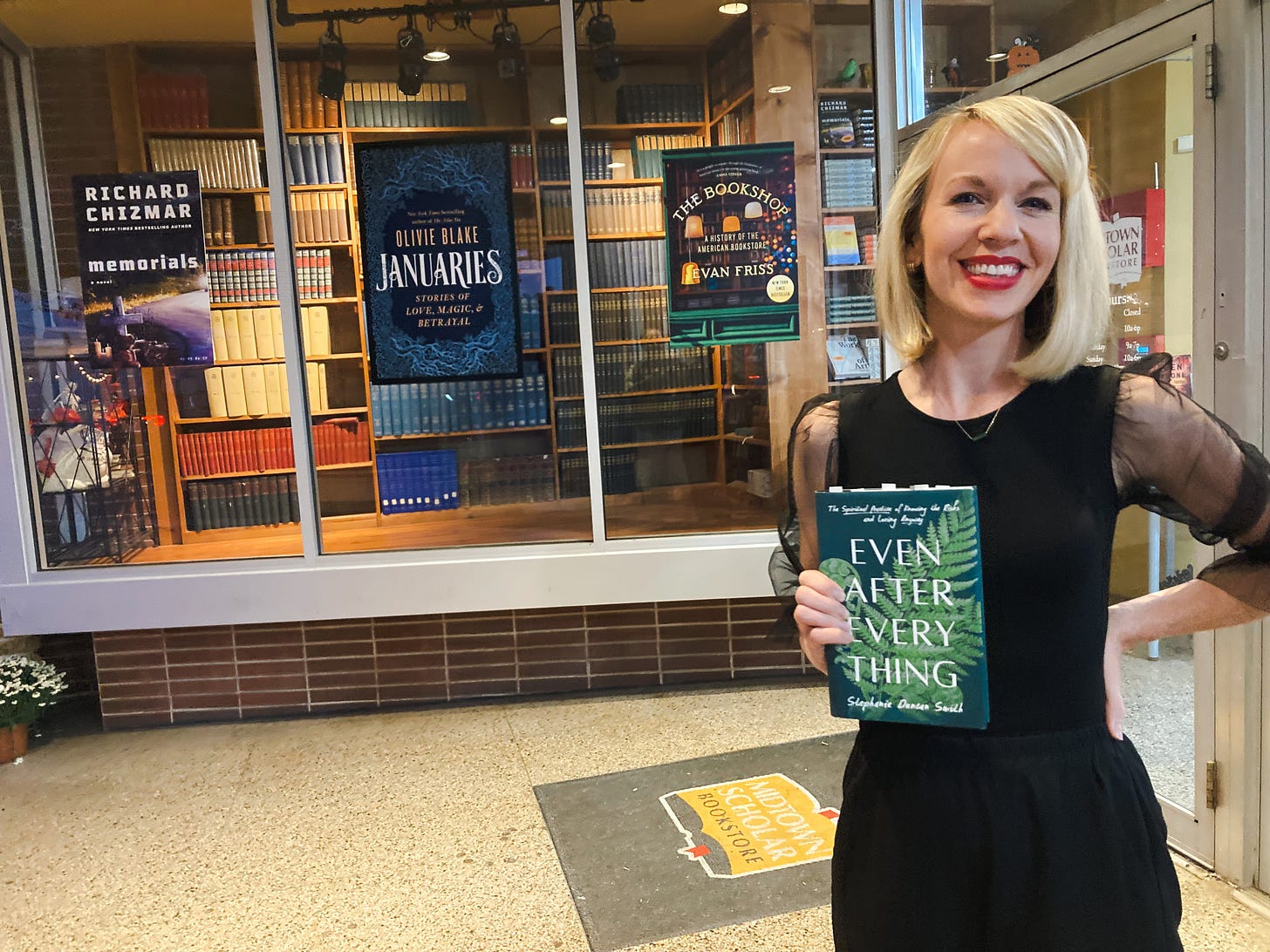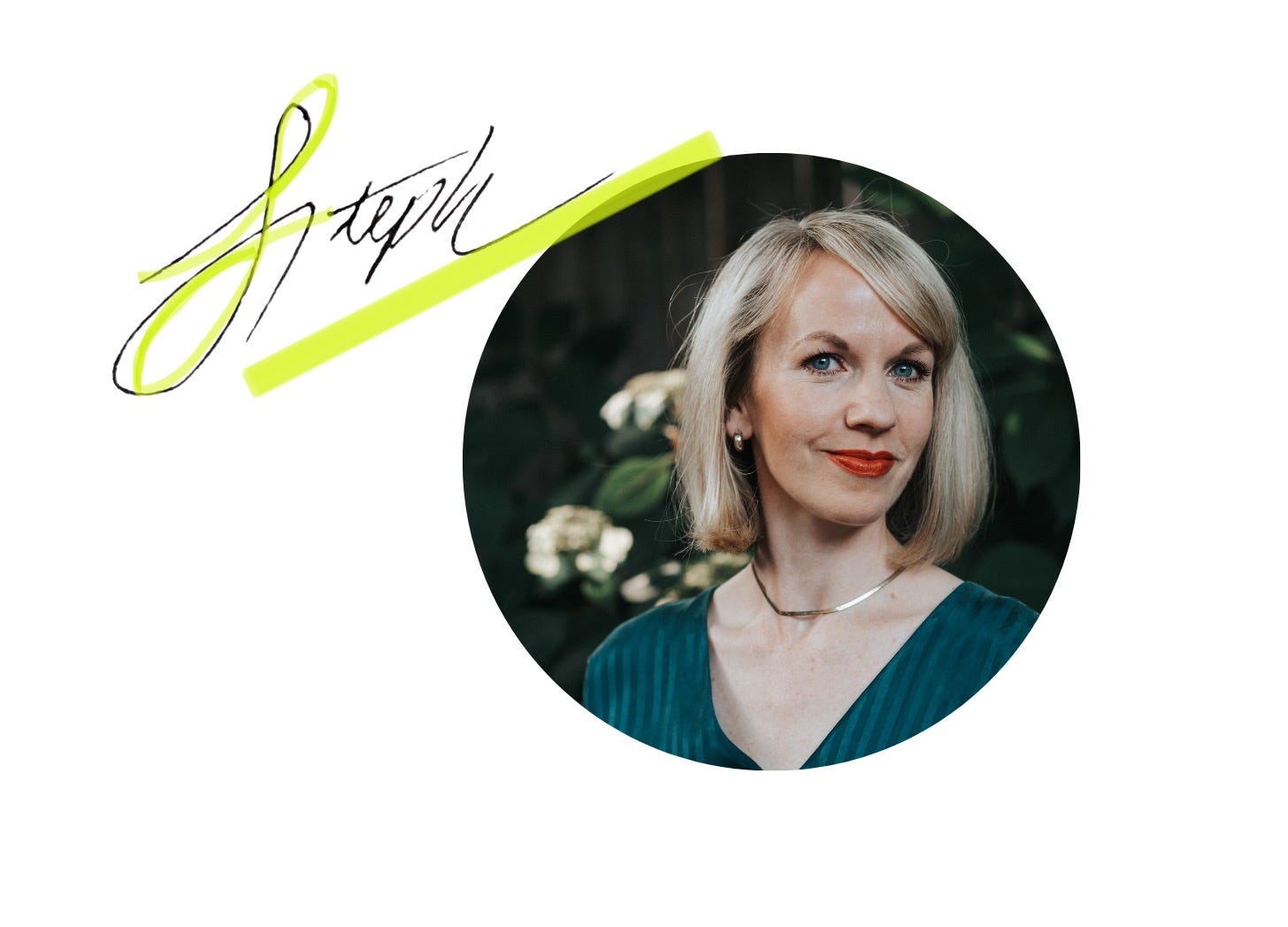🌿 Today-only book sale!
Plus advice for hopeful authors
Big news! Today only—Sat, June 7—you can get the Kindle ebook edition of Even After Everything for $1.99.
If Slant Letter has taught and told you about the writing process, Even After Everything is here to show you what these craft principles look like on the page.
This book is my creative offering:
For when you need an anchor to steady you in the spiral—p. 10-13
For when you’re discerning a big decision—p. 90-93
For when you struggle to trust your joy—p. 101-103
For when you need to remember how to stay with your breath—p. 131
For when you need to close your stress loops, and receive God’s peace—p. 174-179
We’ll be closing out our close reading of Pádraig Ó Tuama’s In the Shelter next week, but for today for fun, I’m opening up a paid post so you can all read my AMA (Ask Me Anything) about a long-time editor becoming a first-time writer. We’re talking writing process, rituals that sustained me along the way, advice for author-hopefuls who feel overwhelmed by the traditional publishing industry, and more.
Special thanks to
who put together an amazing list of questions for me, some of which are answered here, in addition to yours. Jackie is one of the creators of the Lily Huckleberry book series, which is a cult favorite in our house.Let’s get into it!
What’s your writing process like? How many drafts?
In a word, a labyrinth. It’s like trying to locate and lift a single golden thread out of a hopeless tangle. I started the book with a single Google doc that became over 100,000 words, and the ratio of those that made it into the final manuscript is fractional. But this was my raw material draft, where anything and everything was allowed.
From there, and as I made my outline and gave each chapter a specific job, I copy/pasted what I wanted to keep working with into a new chapter-specific doc. At the bottom of each chapter doc, I have a MISC section, for material that I’m percolating on but doesn’t have a home yet, and a CUT section, for material I no longer want to use, but I always save the scraps.
How many drafts? I couldn’t even tell you. Three years of writing and rewriting’s worth. I had two rounds of rigorous edits with my publisher, but many personal drafts and manuscript eras before that.
What rituals, books, or songs sustained you along the way?
Funny you should ask! As always, you’re getting this here first: my publisher asked me to put together an Even After Everything playlist, and here she is! These songs were the soundtrack to my writing, many of them on my birthing playlist for both my babies. They are about as enneagram four as they get!
Rituals that sustained: writing outside as much as I could are some of my most peaceful, satisfying writing memories. Something about the leaf-rustling wind, the shadows of swaying branches. Lots of porch writing for this book.
How do you quiet the doubt demons??
I wish I had something more to give you here, but the truth is there are no hacks nor quick-starts. All I can say is the more you spend time with your voice, and let it speak as she or he must, the more you will trust your instincts. It is always good to practice presence with one’s voice, and this begins with listening to your life and letting it speak. Howard Thurman writes of “the sound of the genuine,” and I think you know it when you hear it in your own life. Such deep listening also often requires tuning out of the noise, out of the comparative reading that we do when we size up our writing to other writers, out of the critic voices that say we can’t.
At least for me, doubt gets loudest when I’m thinking big—big plans, big hopes, big expectations. So it can help to think small instead: write the next true sentence, as Rachel Held Evans used to say. Just say the next true thing right in front of you. That’s more than enough.
What would you say to a hopeful-author who still just had the idea and a dream, but feels very overwhelmed by the traditional publishing industry?
When we speak of “getting published,” that’s a very one-dimensional reference, when publishing can look like a million different things. So first I think it’s best to decide for yourself what success or satisfaction looks like for you. Very few books, in proportion to the number of books published each year, will become instant bestsellers. If that’s your goal, it’s likely a set-up for disappointment.
But maybe what you really want is to publish with a small press that will provide an incredible team to work with who really gets you and your vision. Maybe what you really want is to have a book so you can have a book table at your speaking engagements, for readers to go deeper. Maybe you’re a scholar and academic publishing is your goal, which has a very different publishing model. A really great goal, if you ask me, is waking up the day after your book release thinking I’ve done everything I can, and whatever happens from here is bonus. A good goal is not crossing your fingers for the fairy dust to land on your book.
As much as you can, research comp authors and titles, and think realistically about what you most hope to accomplish. Of course getting an agent will be a good move and guide when you’re ready.
Finally, I think it’s vital to count the opportunity cost. Writing the book is only part of the work. Are you willing to do the daily work of building a platform, growing an email list, creating social media and managing the many details of public-facing work? How much are you willing to make the details of your private life public? You set the terms, of course. You don’t have to do any of this. But the labor is very real and demanding, and it’s best to go into it, should you choose, with open eyes about what this work will ask of you, what you’re willing to do, and what you’re not.
How did you handle the first round of rejections from publishers?
I wrote more about this in my post about the book’s timeline, but yes, the first time I pitched the proposal I got zero offers. This was surprising (and yeah, deeply disappointing) to me at the time, because I had calls with publishers, but that happens sometimes. But from my own practiced instincts and feedback from publishers even as it accompanied pass notes, I knew this book had something to offer, and I wasn’t ready nor willing to give up on it. But I also knew I would need to get to some serious work—mostly building my platform.
I gave myself a wallow weekend, and I needed it. Then I made a plan and it started with a working ideas Google doc titled ASK FOR HELP. So much of the growth that followed came through you all here and
writers who were generous to join me in some creative cross-pollination. I spent six months working toward this growth, and reshaping some of my sample chapters before pitching again.How did you do being edited, not the editor? Lessons for your own editing?
I genuinely love being edited! Magpies hoard shiny things, and I hoard feedback. I want it all! My worst fear in pitching this proposal was that an editor would more or less say it’s great change these tiny things and let’s greenlight to print. Thank goodness that did not happen. My job is being an outside objective perspective, fresh eyes, for writers who are in the weeds, but I am incapable of doing this for myself.
What do you know now that you didn’t know before your book release?
The practical answer is that I didn’t know I needed a book launch assistant until it felt too late. Lesson learned! Accept any help offered and any help that can be afforded for your sanity. My one regret is that I wish I had planned ahead to get the help I needed.
The philosophical answer is that for all the book-as-baby metaphors that proliferate in our industry, somehow the fact escaped me that the release period is the postpartum period—it’s a tender time, and a time to go gently. Everything feels visceral and you are quite vulnerable. You’ve done more or less everything you can, and what happens next is outside your control.
It’s intensely both/and—you’re so proud of this baby and look at those perfect cheeks! It’s a party, a celebration, and you did that, mama! AND you’re spent, you’re getting acquainted with newfound insecurities and limitations and simple things suddenly seem very hard.
Somehow this surprised me? I’ve found myself grounded by anchoring myself in my actual life—getting the giggles going with my kids, picking fresh sage for dinner, getting my boots on for a walk. All of this feels worlds away from reviews and rankings and such other abstractions, in the best way.
How has writing changed you?
It’s shown me that I am more capable than I think I am. I am an idealist and follow-through is not always my strong suit, but I will always be proud that I finished what I started here. I haven’t held anything back. And it’s made me honest—never before have I done what I ask and task my authors to do, until now. I have whole new reserves of empathy and respect for anyone who engages this work as it requires the whole person.
And I think writing does this for all of us: when we show up to the blank page and contend with it, I think we like who we become. We become people of courage, people who stay with the vision and the heart even in the hard things.
That’s you, my friends: people of courage. That’s you.
Take heart and stay feisty,





Aw! Loved reading these answers. It gives me courage that the creative process is always worth it, no matter the result. And loved the book—the part about how God risked expanding to include us stayed with me and continues to spark my imagination.